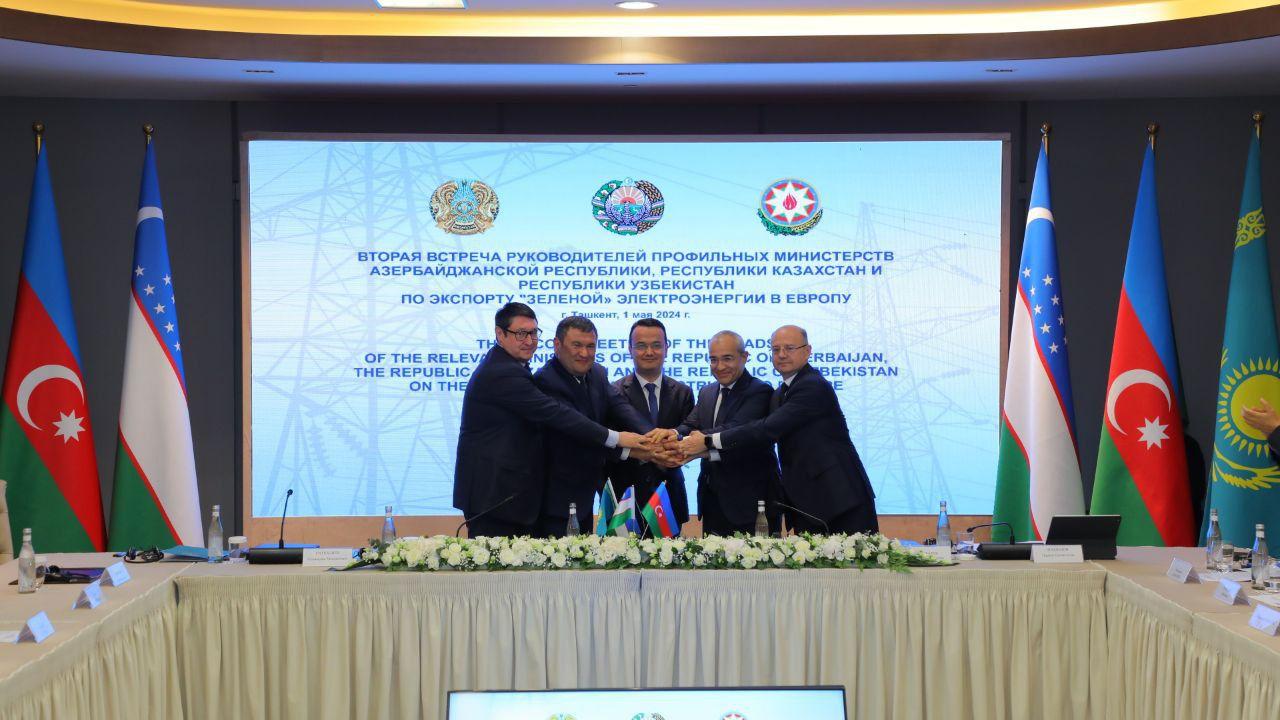Azerbaijan, Uzbekistan, and Kazakhstan are planning to merge their energy systems following a historic memorandum of understanding (MoU) signed by the energy ministries at the Tashkent International Investment Forum on Wednesday.
Azerbaijan’s Minister of Economy Mikayil Jabbarov announced the development on his official X page.
“During the trilateral meeting of Economy and Energy Ministers from Azerbaijan, Uzbekistan, and Kazakhstan, held as part of our working visit to Uzbekistan, we signed the Memorandum of Understanding on Merging the Energy Systems of Azerbaijan, Kazakhstan, and Uzbekistan,” Jabbarov wrote.
According to him, this document will allow the three parties to interact in the production of “green” energy and organize its export through Azerbaijan to Europe, to ensure the integration of energy systems and the efficient use of renewable energy sources.
As part of the deal, the participants will study the possibilities of connecting energy systems by laying a high-voltage cable along the bottom of the Caspian Sea.
Almasadam Satkaliyev, Kazakh Minister of Energy, revealed that a draft technical specification for laying a deep-sea cable beneath the Caspian Sea was drawn up earlier.
“As part of the terms of reference, a proposed business model will be developed for the development of international transmission corridors (financing, revenue flow, and ownership) and for the sale of green energy to the countries of the European Union,” Satkaliyev said, according to the press service of the ministry.
“Based on the above, a draft memorandum of cooperation was developed between the energy ministries of the three countries on the interconnection of the energy systems of Azerbaijan, Kazakhstan, and Uzbekistan.”
A meeting of energy and economy ministers of these three countries that took place in Azerbaijan’s capital, Baku, in November last year serves as the blueprint to establish the foundational terms of energy cooperation between the three nations.
During the Baku meeting, the main agenda focused on exploring the possibilities of electricity exports from Central Asian nations to Europe via Azerbaijan's territory. Attendees reportedly signed a collective statement, acknowledging the renewable energy potential within the region and expressing eagerness to participate in a project aimed at exporting electricity generated from alternative sources to Europe.
The merging of energy systems will have a big impact on the energy landscape as a whole as well as for the three participating nations.
Although Kazakhstan ranks as one of the world’s largest crude oil exporters and holds three percent of the world’s total oil reserves, the country’s wind and solar potential are also substantial. With more than half of the country’s territory seeing average wind speeds of 4 to 5 meters per second – suitable for energy generation – Kazakhstan has significant renewable energy potential.
According to UN estimates, the wind potential of Kazakhstan is 1.8 trillion kWh per year, close to ten times Kazakhstan’s current energy consumption. Solar also has great potential given the number of sunny hours per year – typically between 2,200 and 3,000 – implying a capacity of 1,300-1,800 kW/sqm per year.
Meanwhile, the Azerbaijani government's commitment to shifting its energy reliance from conventional sources to alternative energy is among the priorities in national energy policy.
It is expected that renewables will make up 30 percent of Azerbaijan’s electricity generation by 2030. According to estimates unveiled after the liberation of the country’s territories from the Armenian occupation in 2020, the renewable energy potential of Azerbaijan stands at 37,000 MW. The potential of wind power stands at 59.2 percent of the overall renewable energy potential of Azerbaijan. The solar power comes in at number two with a total of 8,000 MW potential.
Amid the energy and electricity crisis, Uzbekistan’s pursuit of renewables is as much about addressing the threat of climate change. The country has set an ambitious goal to achieve more than 30 percent renewable energy electricity capacity (around 15 gigawatts) by 2030. Uzbekistan has an average of 330 sunny days a year, and the potential for solar energy is huge. Currently, the country has only two large-scale solar farms, each with 100 megawatts.







 Colonel Anar Eyvazov, spokesperson for the Azerbaijani Ministry of Defense, has disclosed significant developments concerning the early withdrawal ...
Colonel Anar Eyvazov, spokesperson for the Azerbaijani Ministry of Defense, has disclosed significant developments concerning the early withdrawal ...
 In a high-profile trial that has gripped the nation, Kuandyk Bishimbayev, Kazakhstan’s former economy minister, has been sentenced to 24 years in p...
In a high-profile trial that has gripped the nation, Kuandyk Bishimbayev, Kazakhstan’s former economy minister, has been sentenced to 24 years in p...
 Foreign Minister of Azerbaijan Jeyhun Bayramov met with his Armenian counterpart Ararat Mirzoyan in Almaty, Kazakhstan, to negotiate the peace agenda.
Foreign Minister of Azerbaijan Jeyhun Bayramov met with his Armenian counterpart Ararat Mirzoyan in Almaty, Kazakhstan, to negotiate the peace agenda.
 Iran's Foreign Ministry Spokesman Nasser Kanani has condemned the Canadian House of Commons vote in support of designating the Islamic Revolutionar...
Iran's Foreign Ministry Spokesman Nasser Kanani has condemned the Canadian House of Commons vote in support of designating the Islamic Revolutionar...



